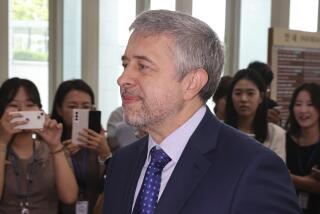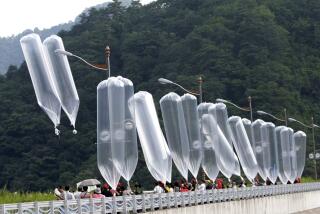Cornered N. Korea Will Stand Firm, Critics Say
SEOUL — The Bush administration’s strategy to pressure North Korea into repudiating its nuclear ambitions through international isolation and economic sanctions is meeting a skeptical response from critics in South Korea and elsewhere who say it simply will not work.
The critics, who include many diplomats and veteran Korea watchers, say that the United States’ refusal to enter direct negotiations with North Korea and a decision to refer the issue to the United Nations will only make the regime dig in its heels. Meanwhile, they say, sanctions against a country that is already one of the poorest and most repressive in the world are more likely to produce a humanitarian disaster than a change of policy.
“Economic sanctions, blockades, punishment will only make the situation worse,” said Moon Chung In, a North Korea specialist with Yonsei University who has close ties to the South Korean government.
South Korea’s Nobel Peace Prize-winning President Kim Dae Jung and the president-elect, Roh Moo Hyun, who is scheduled to take office Feb. 25, are hoping that South Korea can open a line of communication between the United States and North Korea.
“We feel that if this goes to the U.N. Security Council, it will take more time and drag on,” said Yoo Jay Kun, an assemblyman who serves as an advisor to Roh. “We would rather see America directly engaged with North Korea.”
Assistant Secretary of State James A. Kelly is expected to visit Seoul during the second week of January to meet with Roh. Shortly afterward, Roh plans to send an envoy to the North Korean capital, Pyongyang, perhaps with a message from the U.S. administration, Yoo said.
The North Koreans have refused to discuss the issue of nuclear weapons with either South Korea or Japan and have instead sought direct talks with the United States. They take the position that the 1994 agreement under which they were supposed to relinquish their nuclear program in return for energy assistance was a bilateral one with the U.S.
The Bush administration has been equally adamant that it does not want to become mired in what would surely be protracted and difficult talks with the North Koreans. Since President Bush took office, there has been one official visit of a U.S. envoy to Pyongyang -- an October trip by Kelly during which the North Koreans were forced to admit that they were secretly trying to enrich uranium for nuclear weapons.
The administration takes the view that North Korea’s pursuit of weapons of mass destruction is a matter of concern for the entire international community, not just the United States, and that negotiating at this time would be succumbing to nuclear blackmail.
The fact that North Korea was caught red-handed with the uranium-enrichment program -- in clear violation of the 1994 agreement -- cast doubt on their trustworthiness as far as future deals are concerned.
“The North Koreans have lied about every agreement they’ve signed. How can you deal with them?” said a Western diplomat here.
Even many critics acknowledge that the White House is right in principle. But they say the approach is wrong in practice and will only make the North Koreans more determined and more dangerous.
“On the one hand, they have a point. But being so rigid and refusing to negotiate with the North Koreans is a big mistake. It is simplistic, it is idiotic, to think that any negotiation is a concession. It could easily be a big disaster,” said Daniel Pinkston, a North Korea specialist at the Institute for Nonproliferation Studies in Monterey, Calif.
Another advocate of direct negotiations is Donald P. Gregg, the U.S. ambassador to South Korea under the previous Bush administration and chairman of the Korea Society.
“Washington keeps saying, ‘We won’t reward bad behavior,’ and the problem is that now the Bush administration has a ‘face’ problem -- because the more they say that, the more it makes it harder and harder to start talking,” Gregg said.
One of the hang-ups for the Bush administration is the specter of what happened in 1993-94 when the Clinton administration was confronted with a similar challenge from North Korea.
At the time, North Korea threatened to pull out of the Nuclear Nonproliferation Treaty and then started removing spent fuel rods from its 5-megawatt reactor at Yongbyon, presumably to extract weapons-grade plutonium.
The end result was the 1994 agreement under which the U.S., with funding from South Korea, Japan and the European Union, pledged to build for North Korea two “safe” light-water reactors for its energy needs and to supply it with 550,000 tons of fuel oil annually until the reactors were completed. The Bush administration has never liked the deal, which was brokered by former President Carter and which it sees as unduly generous to the North Koreans.
Scott Snyder, the Seoul representative of the Asia Society, notes that the Clinton administration also insisted at the beginning of the earlier crisis that there would be no negotiations.
“It took months for a negotiating avenue to be determined and for the U.S. to come to the table. We are in a very similar situation,” Snyder said.
Many seasoned diplomats believe that the Bush administration -- whether directly or indirectly, through its allies -- will eventually negotiate a settlement of the standoff with the North Koreans.
“The situation will likely get much worse before it gets better, but I don’t think it will go down to disaster,” said Han Sung Joo, South Korea’s foreign minister during the previous crisis.
*
Times staff writer Alissa J. Rubin in Vienna contributed to this report.
More to Read
Sign up for Essential California
The most important California stories and recommendations in your inbox every morning.
You may occasionally receive promotional content from the Los Angeles Times.










